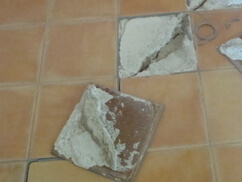We were instructed to visit a property in a well-respected area of SW Mallorca and asked to look at an entrance lobby, which appeared to be leaning.
Once within the property, we noted repairs had been carried out to the original property and permission to investigate further was obtained from the owner.
This involved taking up a few tiles and exposing a few filled cracks. It also involved a more detailed study of the house and ground.

Further research was carried out on the history of the property including going back to study the original plans and documents.
The information provided did not specify exactly where the soil tests were carried out on the plot or surrounding area.
Our research found that the architectural recommendations at the time of the report include the use of a slab or rigid foundation as the land contains aggressive sulphates and gypsum limestone and that caves and mines are known to have existed in the area. this hadn’t occurred.
Furthermore, heavy rains or extended droughts can bring on cover collapse. Each weakens the soil over a grike (natural pothole), either by saturating the soil with water or robbing it of cohesion.
Near buildings, downspouts and leaking utility pipes can accelerate the process. Eroded soil falls into the grike and water moves the soil to an underlying cave, forming a cavity in the mantling soil. In high-flow events, water in the cave may back flood into the overlying soil. As the water recedes, the cave and grike drain faster than the soil, which means that saturated soil spans the void in the grike. The overloaded soil arch falls into the soil cavity and the cover collapses.
The resulting research coincided with further movement cracks opening up in the land and building.
We, therefore, advised the owners of our findings and shortly after the property had to be vacated as imminent collapse was likely.
The owner of this 4m€ property is now left with a condemned house on a plot that is likely to disappear down a big hole.
They had bought a house that had serious problems covered up and disguised at the time of the purchase and the whole situation could probably have been avoided if he has had a survey at the time of purchase.



